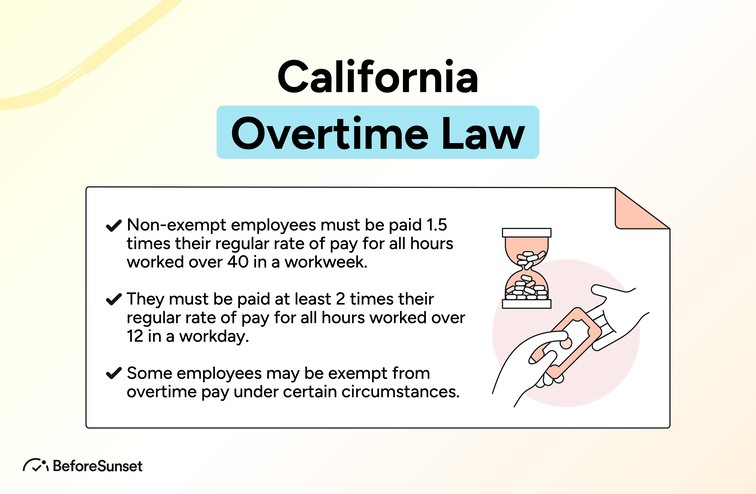As we begin to wrap up 2022, work-life balance and ways in which employers can maximize employee well-being have become an increasing priority. Consequently, companies across the globe are turning to positive role models across the globe to adapt their new year strategies to fight back against what is now being called the "Great Resignation".
As a prime example of a state that has been leading the movement for worker well-being, California's new overtime law has been top of mind for many companies and states.

How to Help Employees Manage Their Time
Understand what their priorities are, and empower them to act on those priorities.
Allow employees to prioritize the tasks they’re assigned. When you have a team of people working toward different goals, it becomes very important for everyone involved to know how much time they need for each project.
Give employees the freedom to say no when it’s necessary, so they don’t get burned out or fall behind on other projects.
When you’re a manager, it can be easy to fall into the trap of assigning tasks and having your employees get them done as quickly as possible. However, this doesn’t allow them to prioritize their work or give them any freedom. Instead, try giving your team members more control over what they do day-to-day—and show that you trust them by doing so.
Companies can find ways to encourage balance through flexibility
One way to promote balance is by allowing your employees to work remotely. This could be at home, in a coworking space, or even at a coffee shop. The flexibility of working remotely allows you and your team members to experience the benefits of a healthy work-life balance, like spending time with family or friends, exercising, and enjoying hobbies outside of work. Other ways companies can encourage balance include flexible hours and locations for employees as well as telecommuting options for those who need it most.
Employers can find ways to give their employees more autonomy, along with training and support in decision-making
Autonomy is important to employees. It gives them a sense of control over their work, which in turn can help them feel valued by their employers and engaged in their jobs. When companies give employees more autonomy, they're likely to see improved engagement and job satisfaction—not only among those employees who have been given more freedom but also among those who haven't yet been given that opportunity.
The Key to Happier, More Productive Employees
Organizations can adopt policies that recognize the benefits of a healthy work-life balance, not just for productivity's sake, but for employee wellbeing
In addition to helping with productivity and employee retention, there are two other key benefits of a healthy work-life balance:
A happy, satisfied workforce is more likely to bring their best selves to work, which means they'll be more productive and creative.
A happy workforce will also be less likely to get burned out or suffer from burnout syndrome.
Here, a key strategy will be adopting technological tools to empower employees and instill trust in their ability to maximize productivity through efficient time management. Work management tools like BeforeSunset have been top of mind as employers look for simple productivity tools in the marketplace that are quick to adopt.

Maximizing Employee Well-Being: The Power of California's Overtime Law
Maybe you're thinking about how much time-and-a-half overtime is going to cost your company. But it's important to remember that the benefits of California's overtime law outweigh any costs, and they can be applied in other ways.
First, there are many benefits of time-and-a-half overtime for employees:
It helps workers stay healthy by encouraging them to take more breaks during their workday, which gives them some time away from their job.
Employees will feel more productive because they'll have more energy after taking a break during the day.
Time, when they're not working actually, makes people want to come back! Plus, everyone knows that feeling better at work contributes positively to their overall well-being and productivity levels over time.
California's new legislation will require companies to pay time-and-a-half overtime to employees making less than $62,400 a year
California is on the verge of fully enacting the legislation that will require companies to pay time-and-a-half overtime to employees making less than $62,400 a year.
The law has taken effect in 2022 and has already impacted a significant portion of the state's workforce, including white-collar workers (think attorneys and accountants) who are currently exempt from overtime requirements due to their professional classification.
The law, SB 3, passed in January 2022 and will impact a significant portion of the state's workforce
The law, SB 3, passed in January 2022 and has already impacted a significant portion of the state's workforce. The new law will affect all employees earning less than $62,400 a year—a substantial increase from prior years when the threshold was much lower at $41,600. The change is meant to be phased in over several years:
In 2021 (July 1), the minimum salary has gone up from its original rate of $11 per hour ($16 per hour for small businesses with 25 or fewer employees) to $13 an hour ($18 per hour for small businesses).
In 2022 (January 1), the minimum salary has gone up again to $15 per hour ($21 per hour for small businesses).
Finally, in 2023 (January 1), it will go up again to $17 an hour for large employers and $21 an hour for small ones.
Many people who do not currently qualify for overtime wages would be newly eligible under this law
The law will apply to employees who make less than $62,400 a year. This means that a significant portion of the state's workforce would be newly eligible for overtime wages. Many people who do not currently qualify for overtime wages would be newly eligible under this law.

In anticipation of the law change, employers are encouraged to review their compensation policies
With the new year, employers are encouraged to review their compensation policies. Many California companies have already taken steps to prepare for this change, but others may not have even begun thinking about it yet.
In anticipation of the comprehensive law change, employers should consider the benefits of California's overtime law for their own employees' well-being: after all, if anyone is going to be affected by this legislation it's going to be them! Companies will have a lot on their plate when it comes time for implementation—but if you're willing to put in a little extra work now then you'll be able to reap some big rewards later (i.e., happier employees).
The $20 Million Labor Cost Challenge
Some companies anticipate spending as much as $20 million a year in additional labor costs once the law takes effect.
Others are developing strategies to avoid paying overtime by hiring more part-time workers and cutting back on hours to bring down their monthly payroll obligations.
The state's new minimum wage and overtime laws "will lead to lower compensation levels," said Michael Saltsman, research director at the Employment Policies Institute, a conservative think tank in Washington. He said it could raise some low-skilled workers' pay but also make it harder for many people to find jobs at all.
Most companies have already been operating under the assumption that employees should not be working more than 40 hours a week, even though no overtime was required to be paid
If you're a business owner, the changes in California's new overtime law will mean little to you. You've likely been operating under the assumption that your employees should not be working more than 40 hours per week, even though no overtime was required to be paid.
It's important that we recognize our own cultural biases and how they affect both ourselves and those around us. Because when we assume other people are wrong or misguided, we can't engage in meaningful dialogue with them. And if we want to create change in our companies and communities, understanding other perspectives—and taking responsibility for our actions—is crucial.
Time Off Wins Over Money: The Overtime Preference
The California Labor Code dictates a maximum of 12 hours of work per day and an average of 40 hours per week. However, many employees are working far more than that. According to a recent study by the Council of Economic Advisers (CEA), approximately 72% percent of American workers say they would prefer time off over extra pay for working overtime hours.
One reason why employees prefer time off over monetary compensation is that it gives them more time to spend with their family and friends. This is especially true for parents who may not be able to afford childcare on top of their already long work days.
By giving employees this incentive to leave early or come home early, companies can help relieve some stress from their workers' lives while also increasing productivity in the office as well as relieving congestion during rush hour traffic times when everyone else is trying to get home at the same time!
In addition, since most people have hobbies outside of work such as sports teams or volunteer programs that require commitment during regular business hours - having fewer obligations outside will allow them more freedom in choosing activities that align better with what matters most: family friends relationships health happiness
Time off can come in many forms, such as flex time or extended benefits coverage for childcare and eldercare
You don’t have to offer paid time off in the same way as California does, but how you structure your policies has a big impact on employees’ lives. Here are some ideas for how you can use this law as inspiration:
Flexible hours. In addition to being able to take comp time, workers could be allowed some additional flexibility in their schedules. For example, employees could trade a full day off each week for an hour or two of work each day at their convenience during that week. This would give them more scheduling power and allow employers like Amazon and Walmart, which employ many hourly workers who need flexibility but don't necessarily have much control over their schedules (or who are locked into machines), to meet employee needs while still maintaining efficient operations.
Extended benefits coverage for childcare and eldercare. As part of its new overtime laws, California expanded its paid family leave policy so that it now includes paid time off not only for new parents but also those caring for sick family members--and it increased annual leave policies from three weeks per year up to six weeks total per year at full pay plus 12 days annually at half-pay (or 40% of your salary). This provides people with much more financial stability than before--and fewer worries about losing their jobs when they're trying desperately to get better care for themselves or loved ones
Companies that offer generous benefits packages and alternative work schedules tend to attract and retain top talent better than companies that do not
Companies that offer generous benefits packages and alternative work schedules tend to attract and retain top talent better than companies that do not. Employees who are offered time off instead of overtime compensation are more likely to stay with the company. While there are many reasons for this, it's likely because employees feel more valued by their employers when they're treated well and allowed to balance their personal lives with work commitments.
By implementing policies like those in California, you can create a culture of respect among employees while also strengthening your bottom line.
The new overtime law will present challenges for California businesses, but many are finding ways to make it work in their favor
To prepare for this change and ensure that they have enough staffing to meet the demand of their customers during peak hours, many businesses are working with staffing agencies or recruiting new employees. They're also keeping in mind that they may need to raise wages so they can offer their employees more opportunities outside their current roles and responsibilities.

What Will CA Overtime Laws Bring to Employees?
The new overtime law presents challenges for California businesses, but many are finding ways to make it work in their favor. The benefits of a healthy work-life balance and more time off at home can go a long way toward keeping employees happy and engaged in their jobs. Employers who offer these kinds of benefits tend to attract top talent, which helps them compete in today’s competitive job market.

